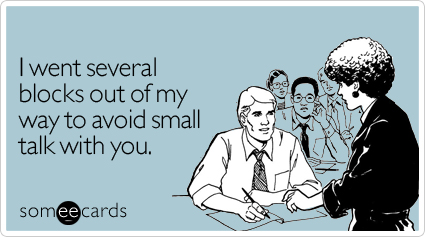What you may not realize is that the interview is already in full swing, and the interviewer may have already decided whether or not to hire you.
New research reveals that many interviewers decide within the first few minutes whether or not they want to hire an applicant. It turns out that small talk is, in fact, a very big deal. While you're waiting for a real question, the interviewer could be quietly questioning you.
Are you able to engage others in general, light conversation? Do you have a "positive, nice" personality? Can you show interest in people other than yourself? Can you put other people at ease in a stressful situation? Could you speak with our clients without causing a problem?
But how can you turn yourself into a skilled small talker of epic proportions, especially if small talk doesn't come naturally to you? Luckily, it isn't too hard! Here are five quick tips for making small talk in a job interview:
1. Listen for key words. Your nerves might make your mind feel like it's swimming, but listen for key words or phrases from the interviewer within the first minute. Weather. Traffic. Busy day. Deadline. Take this key word, or phrase, and respond to it. Yes, it's quite humid outside today for this time of year. They seem to be doing a lot of construction on the freeway lately. Thanks for taking time out of your busy day to meet with me, and on deadline, too. But make sure to...
2. Stay positive. Your commute to the interview may have indeed been a traffic nightmare, and you have horror stories about working under tight deadline, but don't share such details with the interviewer. Keep your small talk positive, smile, and don't get personal. Keep it light. Follow the interviewer's lead (see Tip #1). Don't be afraid to flash a keen wit, but remember to keep it squeaky clean and non-controversial.
3. Show some interest in the interviewer. Small talk is all about showing interest in the other person. In a job interview situation, the interviewer wants to see that you're a "nice" person who would be easy to work with every day. Be this person from the very get-go, but stick to what feels comfortable for you. Most people like to talk about themselves, so...
4. Look for conversational clues. Be very observant as to your surroundings in an interview situation, because the interview setting will likely offer some ideas for light, easy conversation. "I can't help but notice the baseball on your desk. Is that from a recent game?" Bam! You've just opened the door for the interviewer to reveal that he's a big Boston Red Sox fan, and where he got the baseball. Go with the flow, and be genuine about it. People can sense insincerity. You might go ahead and just admit that you're a Yankees fan. Boy, I hope you two get around to the actual interview. At least you won't be lost for conversation, and the interviewer likely won't forget you.
5. Bring the small talk full circle. When the interview is wrapping up and you're both saying goodbye, circle back to the very beginning of the interview and riff off the initial light banter between you two. You might wish the Boston Red Sox fan a great season (except when they're playing the Yankees), make a comment about the weather, the traffic, or whatever small talk topic came up at the start of the conversation. In this way, you're reminding the interviewer that you're a good listener who is great at small talk -- both highly attractive attributes in a co-worker who could eventually be client-facing. You'll leave with interviewer with a good vibe. You're sure fun to talk to, even if you are a Yankees fan.
Most of all, remember that small talk speaks volumes in an interview situation. It matters just as much, if not more, than the rest of the interview! That's because an employer can teach processes, but it can't instill personality. Never underestimate the influence that a seemingly unrelated topic of conversation could have on your overall interviewing success. Now get out there, and get conversational!

ConversionConversion EmoticonEmoticon